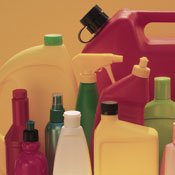Your kitchen counters need to be scrubbed, the floor needs to be mopped, the windows are looking smudgy, the air smells funny, and the bathroom is a mess. Just reach for the bottle of cleaner and freshener with aerosol propellant, right?
Think again.
It's hard to imagine that something out there may be more dangerous than the germs we are trying to clean, but there often is: the actual cleaning product.
The Environmental Protection Agency reports that air inside our homes can be up to five times more toxic than the air outside. Why? Because cleaning agents can be more dangerous than the germs themselves.
Every year, Americans go through about 25 gallons of hazardous chemicals in their homes, write Joel S. Hirschhorn and Kirsten U. Oldenburg, authors of "Prosperity Without Pollution." Most of these chemicals are found in products that unclog drains, clean windows, sanitize kitchen counters and get flushed down the toilet.
To avoid harsh chemicals such as ammonia and formaldehyde, look no further than grandma's old cleaning remedies to find safe alternatives. Using everyday, natural ingredients will help promote a healthy, green lifestyle that costs less than commercial cleaning products, smells great and won't pollute indoor air.
Start by removing all your old products, and then take an inventory of products already in your kitchen that can be used to create mild cleaning solutions. Items such as white vinegar, lemons, baking soda, Borax, salt and cooking oil are common, cheap products to start with.
While it may seem intimidating, Borax (found in many local stores) is a naturally occurring mineral composed of boron, oxygen, water and sodium. A very low toxicity with no chlorine or phosphates makes Borax safe for washing machines, plumbing and humans.
• To create a general household cleaner and disinfectant, dissolve one cup of powdered Borax in a gallon of warm water. You can use this solution on counter tops and other surfaces.
• You can also use borax as a scouring powder on tough stains. Sprinkle a small amount of Borax and baking powder on a damp sponge, scour, rinse and dry with a soft cloth.
• Vinegar is also a powerful cleaning agent that can be used safely without leaving a residue. For a ceramic tile cleaner, add a 1/4 cup of vinegar to a gallon of water. This mixture will remove dirt almost without scrubbing and doesn't leave a film behind.
7 Ways to Use Vinegar at Home
• Dissolve gum: Saturate gum with warm vinegar and remove.
• Clean windows: Mix 1/4 cup of vinegar with a quart of water in a spray bottle. Spray and wipe down.
• Remove stains: Soak stained clothes in full-strength vinegar before washing.
• Clean the coffee pot: Brew a full pot of vinegar to help clean the coffee maker, followed by a half pot of water.
• Clean flowerpots: Use vinegar to remove lime before repotting plants.
• Clean bathrooms: Use vinegar to remove soap scum and mildew in the bathtub.
• Unclog showerhead: Heat equal parts water and vinegar and place showerhead in solution to dissolve impurities.



Comments
Use the comment form below to begin a discussion about this content.